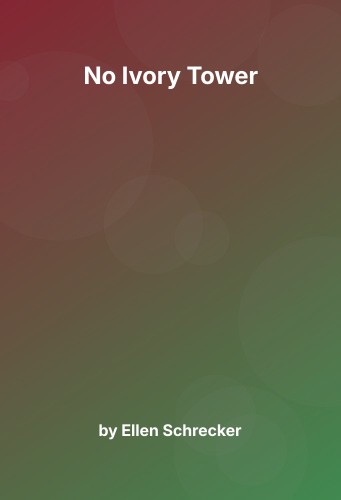Introduction: McCarthyism and Its Impact on American Higher Education
Ellen Schrecker’s No Ivory Tower stands as the first systematic study of McCarthyism’s profound impact on American higher education, situating the academic purges within the broader political and social upheavals of post-World War II America. The roots of McCarthyism trace back to the early Cold War years, when fears of communist infiltration permeated American society. The Soviet Union’s expanding influence in Eastern Europe, the Chinese Communist Revolution of 1949, and the onset of the Korean War intensified anxieties about internal subversion. This climate fostered a nationwide crusade against alleged communists, spearheaded by Senator Joseph McCarthy and supported by congressional committees, the FBI, and various state-level agencies.
In this context, McCarthyism refers to the widespread effort to label individuals as communists or communist sympathizers, subjecting them to public scorn, blacklisting, and the loss of employment. While the entertainment industry and government sectors have often been highlighted as primary targets, academia was nearly as deeply affected by these repressive tactics. Universities, traditionally bastions of free thought and inquiry, became battlegrounds where political paranoia clashed with principles of intellectual freedom.
Public universities such as the University of Michigan, the University of Washington, and Rutgers University were particularly vulnerable due to their public funding and state oversight, which made them susceptible to legislative pressure and loyalty oath mandates. Faculty members at these institutions were expelled or forced to resign based on accusations often grounded in tenuous evidence or guilt by association. Private institutions like Harvard and Reed College, with their greater autonomy, initially resisted these pressures but ultimately faced intense controversy. Harvard famously defended some of its accused faculty members, including the renowned philosopher Sidney Hook, but not without enduring protracted public debates and internal divisions. Reed College, known for its progressive stance, also grappled with accusations against faculty, reflecting the nationwide tension between institutional values and external political forces.
The era was marked by pervasive loyalty oaths, which required faculty to swear they were not members of the Communist Party or affiliated organizations. These oaths, often legislated at the state level, were used as tools to root out dissent and enforce conformity. Legislative committees, such as the House Un-American Activities Committee (HUAC) and various state equivalents, conducted investigations that disrupted academic communities. The FBI played a significant role in surveillance and intimidation, compiling dossiers on faculty and students alike, and collaborating with university administrations to enforce loyalty standards.
Several notable faculty members became emblematic of the era’s injustices. At the University of Michigan, political scientist Mark Nickerson was dismissed for refusing to answer questions about his political beliefs. At Rutgers, political economist Harry Braverman faced similar scrutiny. These individuals endured not only professional consequences—loss of tenure, barred employment opportunities, and blacklisting—but also personal hardships, including social ostracism and psychological stress. Their cases highlight the human cost of political repression and the erosion of academic freedom.
Academic freedom, a concept central to the mission of higher education, was severely tested during this period. Traditionally defined as the right of scholars to pursue truth and express ideas without fear of censorship or retaliation, academic freedom came under assault as universities capitulated to external political pressures. The balance between institutional autonomy and public accountability became a contentious issue, with many administrators prioritizing survival over principle. Faculty unions and professional organizations attempted to defend academic freedom, but their efforts were often undermined by the pervasive climate of fear.
The cultural and social climate on campuses was fraught with tension. Students, faculty, and administrators were divided between those who supported anti-communist measures as necessary for national security and those who opposed them as violations of civil liberties. Some students participated in loyalty oath campaigns, while others formed underground groups advocating for academic freedom and civil rights. Administrators struggled to maintain order and funding while navigating political demands, often leading to self-censorship and compromised standards.
The long-term legacy of McCarthyism in American universities is complex. The purges and loyalty oaths left enduring scars on academic institutions, chilling dissent and fostering conformity. However, the resistance by some faculty and students laid groundwork for later movements advocating civil liberties and academic freedom. Parallels can be drawn to subsequent political pressures on academia, including the Vietnam War-era protests, Cold War security measures, and contemporary debates over free speech and ideological diversity on campuses.
Ellen Schrecker’s No Ivory Tower is a seminal work that not only chronicles the challenges faced by academics during the McCarthy era but also serves as a cautionary tale about the fragility of academic freedom. Her meticulous research, grounded in archival materials and personal testimonies, sheds light on a critical chapter in American history. Schrecker’s scholarship remains essential for understanding the historical context of political persecution in academia and its lasting implications for protecting intellectual liberty today. By documenting the experiences of those who suffered and resisted, No Ivory Tower champions the enduring values of free inquiry and democratic principles in higher education.

